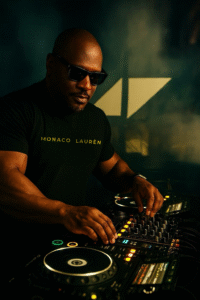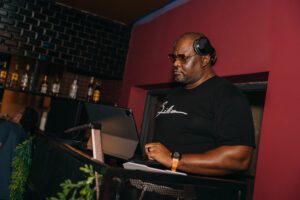Introduction: The Pulse of the Earth, Elevated
Close your eyes and listen — not just with your ears, but with your body.
You’ll feel it first in your chest, then your spine, then in the subtle sway of your shoulders. That’s Afrohouse — the sound of the earth awakening beneath your feet.
Rooted in Africa’s ancestral rhythms yet carried by the winds of modern electronic production, Afrohouse is more than a genre. It’s a ceremony — a fusion of body, spirit, and sound that transforms dancefloors into temples.
Across continents, from Johannesburg to Ibiza, from Cape Town to Dubai, Afrohouse is rising — uniting people through deep rhythm, rich emotion, and transcendent energy.
And at the forefront of this awakening stands Monaco Lauren — an international producer, DJ, and visionary whose artistry turns every beat into an experience of connection.
1. What Is Afrohouse? The Sound of Spirit and Sophistication
Afrohouse sits at the intersection of African percussion and deep house elegance — soulful, spiritual, and hypnotic.
The Key Elements of Afrohouse
- Percussion: Layered tribal drums, congas, shakers — rhythm that feels organic and alive.
- Vocals: Often chant-like, ethereal, or rooted in traditional African storytelling.
- Tempo: Around 120–125 BPM — grounded yet uplifting.
- Emotion: Deep, meditative, and euphoric at once.
It’s music for those who crave movement with meaning — rhythm with depth.
Unlike commercial EDM, Afrohouse invites inward exploration as much as outward expression. It’s not about flashing lights — it’s about inner illumination.
2. The Roots: From South Africa to the World
Afrohouse emerged in South Africa in the early 2000s, growing alongside Deep House and later inspiring Amapiano. It drew from Kwaito, tribal house, and soul, evolving into something uniquely African — both modern and ancient.
Producers like Black Coffee, Culoe De Song, and Da Capo introduced the sound to global audiences — transforming underground sets into sacred ceremonies.
Today, Afrohouse travels far beyond its birthplace.
It’s played in Ibiza clubs, Paris lounges, and Bali retreats — carried by DJs who understand that rhythm can heal as much as it can entertain.
3. The Feeling: Music as Meditation, Movement as Prayer
To the Cultural Soul Seeker, Afrohouse is more than dance music — it’s a form of meditation.
Each drumbeat carries memory, each melody carries intention.
The sound opens the heart, aligns breath and movement, and creates an unspoken connection between strangers on the floor.
For Monaco Lauren, this is where his artistry lives. His Afrohouse productions use healing frequencies, ancestral drums, and sonic layering designed to shift emotional energy.
In his own words:
“Afrohouse isn’t just sound, it’s a frequency. It moves the body, but it also restores the soul.”
4. The Culture: Where Art, Fashion, and Energy Intertwine
Afrohouse isn’t confined to clubs — it’s a lifestyle.
It shows up in fashion, wellness retreats, and spiritual gatherings.
- Fashion: Earth tones, textures, and patterns inspired by African heritage. Think linen, leather, and beadwork — elegance rooted in ancestry.
- Events: From Afro Nation to deep house circles in Marrakech, it creates community wherever rhythm leads.
- Wellness: The music’s meditative nature makes it a favorite for yoga, sound healing, and conscious festivals.

Trendsetters embrace it as a symbol of balance — modern luxury with ancestral grounding.
5. The Global Afrohouse Movement
The global Afrohouse scene has expanded far beyond Africa.
Cities like Lisbon, Berlin, New York, and Dubai now host dedicated nights where diverse crowds gather to celebrate rhythm and presence.
Streaming platforms have followed suit, Afrohouse playlists now reach millions, proving that people are craving music that feels alive, connected, and soulful.
And at the heart of this global energy is Monaco Lauren — whose performances embody the fusion of luxury, culture, and consciousness. His sets are not just curated — they’re crafted with intention, guiding audiences through waves of rhythm and emotion.
He doesn’t just play the music. He channels it.
6. Afrohouse vs. Amapiano vs. Afrobeats
While Afrobeats, Amapiano, and Afrohouse share the same African rhythmic roots, each genre tells its own unique story — reflecting a different kind of energy, emotion, and cultural essence.
Afrobeats
- Energy: Upbeat and lyrical
- Mood: Joyful and vibrant
- Essence: About expression and celebration — music that inspires movement and confidence.
Amapiano
- Energy: Bass-heavy and deep
- Mood: Playful and hypnotic
- Essence: Social and communal — designed for shared moments on the dancefloor.
Afrohouse
- Energy: Rhythmic and steady
- Mood: Spiritual and transformative
- Essence: Introspective and healing — where rhythm connects body and spirit.
Monaco Lauren moves fluidly between all three, a true cross-genre architect. His artistry merges the spiritual depth of Afrohouse, the hypnotic groove of Amapiano, and the celebratory flair of Afrobeats. The result is something unmistakably his own: a refined fusion of rhythm and consciousness that transcends geography, inviting listeners everywhere to move, feel, and awaken.
7. The Experience: Where Monaco Lauren Transcends the Stage
For the Global Jetsetter, Afrohouse is not just something you listen to, it’s something you live.
Picture a rooftop in Dubai, a villa in Cape Town, or a private island event, the pulse of the music sets the tone.
When Monaco Lauren performs, the atmosphere shifts. Lights dim. Drums echo. The crowd synchronizes.
Every movement feels deliberate, every drop emotional. It’s not a show, it’s an awakening.
His Afrohouse sets are known for their sophisticated energy, soundtracking the world’s most luxurious spaces while maintaining authenticity to the genre’s roots.
8. The Future: Afrohouse as a Conscious Global Movement
The future of Afrohouse lies in its intention.
As people seek more meaningful experiences, the music offers a sanctuary — a space where rhythm meets mindfulness.
Expect to see:
- More fusion with world music — Latin, Arabic, Indian influences.
- Growth of immersive festivals that blend art, fashion, and spirituality.
- Artists like Monaco Lauren leading the wave of conscious sound design — where every frequency carries purpose.
Conclusion: The Rhythm That Heals, The Sound That Unites
It’s not just a genre — it’s a movement of energy and elevation.
It’s the sound of the ancestors remixed for the modern world — grounding us in our roots while inviting us to rise higher.
For artists like Monaco Lauren, it’s both art and offering — music as medicine, rhythm as connection, and sound as luxury.
Because at its core, Afrohouse is a reminder:
The dancefloor is sacred. The drum is eternal.
And through it all, we are one.




[…] air vibrates with rhythm, where every drumbeat feels alive, you’ve already felt the essence of Afrohouse music.But what is Afrohouse music, […]
[…] In every major city — from Johannesburg to Lisbon, Ibiza to Dubai — one sound is uniting dancers, dreamers, and creators: Afrohouse music. […]
[…] of the larger global house movement that includes Afrohouse, Amapiano, and Deep House, Indo House stands out for its spiritual depth, cinematic soundscapes, […]
[…] output is darker, more percussive, and more confrontational. It’s where Gqom was born, where Afrohouse gained grit, and where the foundations of modern South African dance music were […]